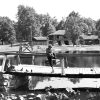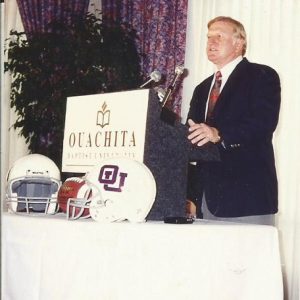calsfoundation@cals.org
Jimmy Dale "Red" Parker (1931–2016)
Jimmy “Red” Parker was a football coach at the high school and college levels who was inducted into the Arkansas Sports Hall of Fame in 1988. Parker coached until just weeks before his death in January 2016. In a career that began in 1953 and ended in 2015, Parker’s combined record as a college and high school head coach at six colleges and universities and five high schools was 322–221–13.
Jimmy Dale Parker was born on October 26, 1931, to Floyd Parker and Madelyn Parker of Hampton (Calhoun County). He graduated from Rison High School in 1949, where he was a star football player, and attended Arkansas A&M at Monticello (Drew County)—now the University of Arkansas at Monticello—where he was a halfback for the Boll Weevil football team from 1949 to 1952.
In 1953, Parker was offered a $10,000 signing bonus to play baseball in the Detroit Tigers organization. By that point, Parker was married, and he and his wife, Betty Ann Parker of Herbine (Cleveland County), already had the first of their three children. Parker decided that he did not want to move to Wisconsin to play for a Tiger minor league team there. Instead, he accepted the position of head football coach at Fordyce High School. He coached at Fordyce (Dallas County) from 1953 to 1960, compiling a 76–15–4 record. The Redbugs had a thirty-seven-game winning streak from 1957 to 1960.
An important turning point came early in his career when he used his own money to travel to Florida for a coaching clinic. While there, he met one of the nation’s most famous college coaches, Bud Wilkinson from the University of Oklahoma. Parker later told an interviewer: “For some reason, Bud Wilkinson just took a liking to me. I just kind of got into his head and listened. I was running plays and calling defenses and had no idea of what it was all supposed to mean together. He made me understand.”
Parker’s first job at the college level was as the head football coach at Arkansas A&M from 1961 to 1965, where he won two Arkansas Intercollegiate Conference championships. His teams there were 29–19–2 overall with records of 2–8 in 1961, 3–6–1 in 1962, 9–1 in 1963, 8–2 in 1964, and 7–2–1 in 1965. At the end of the 1965 season, Parker accepted an offer to become the head coach at The Citadel in South Carolina. He coached there from 1966 to 1972, compiling a 39–34 record.
Parker was hired to replace Hootie Ingram as the head coach at Clemson University in South Carolina following the 1972 season. Parker was 17–25–2 at Clemson. His Tiger teams had records of 5–6, 7–4, 2–9, and 3–6–2. Parker was fired following the 1976 season and replaced by Charley Pell, whom he had hired as an assistant coach. Pell’s first team went 8–4. That began a streak of fifteen consecutive winning records at Clemson, which won the national championship in 1981 under Danny Ford. Steve Fuller, Parker’s Clemson quarterback, later credited Parker with having turned the program around, even if he did not get the chance to enjoy the success of the team.
Parker returned to Arkansas after leaving Clemson and purchased a Chevrolet dealership at Fordyce. In the fall of 1980, he became an offensive consultant at Vanderbilt University in Nashville, Tennessee, at the behest of George MacIntyre, a friend who was in his second year as head coach at the school. Vanderbilt struggled to a 2–9 record that season. Southern Arkansas University at Magnolia (Columbia County) then offered Parker its head coaching job, and he led the Muleriders to a 7–3 record in 1981. That led to an offer to serve as the head coach at Delta State University in Cleveland, Mississippi, where Parker compiled a 34–26–4 record from 1982 to 1987.
Parker’s success at Delta State attracted the attention of Billy Brewer, the head football coach at the University of Mississippi. Brewer hired Parker to be the Rebels’ offensive coordinator. Parker was part of Ole Miss teams, which finished with records of 5–6 in 1988, 8–4 in 1989, 9–3 in 1990, and 5–6 in 1991. After four years at Ole Miss, Parker moved back to Fordyce and resumed day-to-day operations of his automobile dealership.
In 1993, Parker returned to the high school coaching ranks for the first time since 1960 when he became head football coach at his high school alma mater at Rison (Cleveland County). Parker garnered a 38–4 record in three seasons at Rison, including a Class A state championship in 1995 when his team went 15–0. To the west in Arkadelphia (Clark County), another Arkansas coaching legend, Buddy Benson, had decided to step down as the head coach at Ouachita Baptist University following thirty-one seasons. The school’s president, Ben Elrod, was a Rison native and a longtime friend of Parker. Parker accepted Elrod’s offer to become Ouachita’s head coach. Ouachita, the smallest college in the state still playing football at the time, was struggling to make the move from the NAIA to NCAA Division II following the dissolution of the Arkansas Intercollegiate Conference. Parker’s Ouachita teams had records of 3–7 in 1996, 4–6 in 1997, and 3–7 in 1998. Ouachita played as a Division II independent the first season and was a member of the Lone Star Conference the next two years.
Parker decided that Ouachita needed a younger person as head coach, but he believed he still had the time and energy to coach at the high school level. He went to Bearden (Ouachita County) at the start of the 1999 season and compiled a 26–16–4 record in four seasons. In 2003, Parker returned to Fordyce. He was the head coach there from 2003 to 2005, compiling an 11–20–1 record. Parker retired after the 2005 season but came out of retirement to head up the program at Woodlawn (Cleveland County) in 2008. His only team there had a record of 7–4. After Parker’s wife was diagnosed with Alzheimer’s disease, the couple moved to Saline County to be near their son. Benton Harmony Grove High School was starting a football program, and Parker had an interest in helping. Parker’s first team at Harmony Grove went 2–8 in 2010. His second and third teams were both 4–6. Parker finished with a record of 28–35 in six seasons at the school.
Parker had a ventricular assist device inserted in 2010 to help fight congestive heart failure. In 2011, a mechanical pump was inserted. He coached his final season while seated in a golf cart on the sideline. Parker told the Arkansas Democrat-Gazette in October 2015: “I struggle walking. I struggle standing. I struggle doing everything. To be honest, I’m worn out.”
Parker died of heart disease on January 4, 2016. His wife had died the previous April. He is buried at Pinecrest Memorial Park in Alexander (Pulaski and Saline counties).
For additional information:
Crise, Doug. “Coming Home.” Pine Bluff Commercial, September 12, 2003, pp. 1B, 4B.
Jones, Rudy. “Former Clemson Coach Red Parker Is Still in the Game.” Spartanburg Herald-Journal, September 21, 2013.
Muck, Jeremy. “Jimmy ‘Red’ Parker Ending His Run.” Arkansas Democrat-Gazette, October 29, 2015, p. 1C.
———. “Parker Epitome of Coach for 62 Years.” Arkansas Democrat-Gazette, January 5, 2016, p. 1C.
Rex Nelson
Simmons Bank







Comments
No comments on this entry yet.